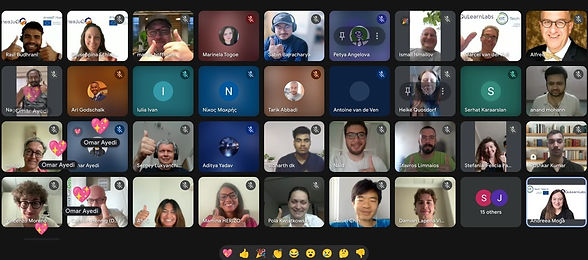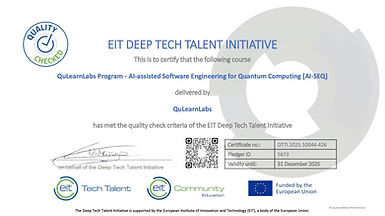
AI-SEQ program
AI-assisted Software Engineering for Quantum Computing and PQC
Join our 8-10 week online program and explore the future of software engineering, AI, and quantum computing. Learn live from leading experts and gain practical experience in AI-assisted software engineering for quantum computing and post-quantum cryptography.

Online Community
Peer-to-peer and instructor-led asynchronous mentoring in the community forum

Adaptive Learning
Use Q, our proprietary 2 in1 AI-coding and AI-learning assistant

Live Mentoring Sessions
Get inspired by guest speakers and ask your questions live 1h/week
Building a global learning community for quantum computing and deep tech
Who is the AI-SEQ program for?
Anyone and everyone! Whether you are a student or working professional, a beginner in programming or a quantum computing expert, AI-SEQ is designed for you. Our online course helps you build skills, advance your career, and expand your knowledge in software engineering for quantum technologies.

What you'll learn
-
Quantum computing fundamentals and mathematical foundations
-
AI-assisted quantum algorithm development using Visual Studio Code and GitHub.
-
Post-quantum cryptographic implementations
-
Industry-standard quantum development tools
-
Real-world quantum applications and use cases
Program stucture
Duration: 8-10 weeks
Prerequisites: Programming language
Start date: January, 2026
Format: Online with live-mentoring sessions every Monday 19.00 CET
Everything included only for
Why is the program AI-assisted?
Current advancements in AI are transforming the job market and the way companies innovate, develop software, and adapt. At QuLearnLabs, we believe human software engineers should not be replaced by AI or agentic systems, but rather empowered and supported with AI tools– maintaining human oversight, accountability, and control while enhancing productivity and learning.
Learning modules
1
Software Engineering Essentials
In the first week of AI-SEQ, you’ll get fully onboarded with the tools, meet the team and your peers, and gain a solid introduction to the fundamentals of software engineering.
2
AI-assisted Software Engineering
Introduces Q, an open-source AI coding assistant developed by us. Learners explore how to integrate Q into their development workflow to accelerate coding and speed up the learning process.
3
Python Programming Refresher
Covers essential Python concepts for quantum development, including variables, functions, control structures, data types, libraries, and scripting with Jupyter Notebooks.
4
Introduction to Quantum Computing
Covers the motivation for quantum computing, limits of classical systems, rise of QPUs, and the broader deep tech ecosystem. You’ll also explore the broader deep tech ecosystem shaping advanced computing.
5
Quantum Information & Qubits
Introduces the core principles of quantum information science, including qubits, superposition, entanglement, Dirac notation, and the mathematics of multi-qubit systems.
6
Quantum Circuits & Algorithms with Qiskit
Focuses on building and simulating quantum circuits using Qiskit. Topics include basic quantum gates, entanglement, and algorithms such as Grover’s search.
7
Post-Quantum Cryptography
Introduces quantum-safe cryptography, focusing on lattice- and hash-based methods, and highlights their role in securing the future of digital systems.
8
Capstone Project
As a learner, you’ll apply your skills in a final project by developing and presenting a working quantum application that showcases your readiness for careers in the deep tech space.
What do you get when you’ve completed the program?
Accredited Certificate
Issued by QuLearnLabs and Quality Checked by the EIT Deep Tech Talent Initiative and EIT

Hands-on Knowledge
Have the ability to construct quantum circuits and algorithms for problem-solving on quantum hardware

Expanded Network
Expand your professional network by connecting with peers and industry leaders in quantum technologies

Alumni Community
Gain access to a thriving Alumni community where job opportunities, hackathons and events are shared frequently




